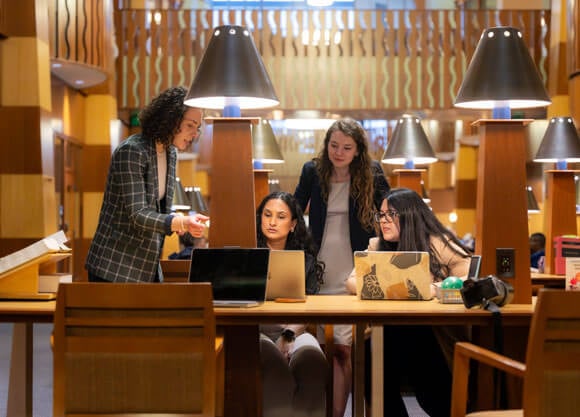
Unique Federal Pro Se Legal Assistance Program to call Quinnipiac School of Law home
December 03, 2024

December 03, 2024

Commencing in January with the Spring 2025 semester, the program will provide free information, advice, and limited scope legal advice to pro se (self-represented) civil litigants throughout the district, and unparalleled experiential learning opportunities for law students.
The program is not part of, nor run by, the U.S. District Court. Generous grant funding from the District Court of Connecticut supports a full-time program leadership position at the School of Law.
Assistant Dean of Experiential Education Alice Rosenthal said Quinnipiac is excited to welcome experienced attorney Catherine Itaya to the School of Law staff to lead the program on the North Haven Campus.
From 2016 through 2021, Itaya directed the City Bar Justice Center’s Pro Se Legal Assistance Project for the Eastern District of New York. In October 2022, Itaya launched the District of Connecticut’s Federal Pro Se Legal Assistance Program at the New Haven Legal Assistance Association.
“It’s a well-structured, well-run program with an incredibly experienced, passionate attorney supervising it,” said Rosenthal. “Catherine brings great energy and knowledge and understanding of this type of lawyering. We feel incredibly grateful that she’ll be coming to Quinnipiac with a program she started from the ground up here in Connecticut.”
Chief Judge Michael P. Shea said the Board of Judges of the District Court for the District of Connecticut enthusiastically supports the relocation of the Federal Pro Se Legal Assistance Program to Quinnipiac University School of Law.
“The Program is vital to the Court's ability to provide equal access to justice, and its new home on the Law School campus will enable it to continue to thrive and maximize benefits for pro se litigants,” Chief Judge Shea said. “The court-provided grant to the Law School will support the continuity of the Program's critical work. Moreover, it will help further the Law School's mission by fostering teaching and practical experience that contribute to the understanding and just solution of legal problems and the ideal of equal justice under the law. The Board of Judges appreciates Dean Brian Gallini’s and the Law School faculty's support of the Program.”
Dean Brian Gallini said bringing the program to Quinnipiac further demonstrates the School of Law’s commitment to the state and to the university’s law students.
“I think it is reflective of our commitment to strengthening the rule of law for the citizens of Connecticut, which I think also strengthens our broader affiliation and commitment to our mission in the state; which I’m proud of,” said Gallini. “It also emphasizes our commitment to practical skills training and it’s a further proof point that we are committed to graduating attorneys who are ready to hit the ground running, armed with the skills that one would expect from a newly licensed lawyer.”
The unique access-to-justice program helps pro se litigants who cannot afford counsel to access the federal court when seeking protection of civil and constitutional rights.
“This program is there to make sure that people feel they have equal ability to bring their cases, whatever the outcome, to the federal court,” said Itaya.
Legal subject areas cover a wide range and include civil rights, employment discrimination, disability discrimination, housing discrimination, debt collection and credit reporting violations, and federal benefits appeals. The program helps clients by analyzing potential claims; sharing legal research; drafting outlines of motions and pleadings; explaining civil procedure and jurisdiction; reviewing drafts; and helping with discovery.
Student externs will focus on developing client communication skills, issue-spotting, and legal research. The program also offers students a unique opportunity to learn federal practice and the norms in the District of Connecticut.
Itaya said limited scope legal assistance is a meaningful model for law student externs as the representations are brief and students are exposed to a variety of clients, cases, and procedural postures.
“I think it is a great learning opportunity for students. It involves listening to a problem, issue-spotting, then going through potential legal claims or research,” said Itaya. “Reframing and helping people understand why their case can go forward or why it can’t is helpful to litigants and good for students as a practice.”
In its breadth and variety, program work is similar to clerking, said Itaya, who has served in three federal clerkships.
“You get exposed to a wide variety of substantive law, procedural posture, and jurisdictional issues, which I think is a great type of training for new lawyers,” said Itaya. “This sort of broad exposure teaches thinking and listening skills and there is a lot of room for creativity.”
As one of only a handful of law schools in the nation housing such a program, Quinnipiac is a perfect match for this on-ground experiential opportunity for law students, said Rosenthal.
“We have a very robust externship program through which we connect students with opportunities in the community to practice lawyering specific to their type of interest,” said Rosenthal. “With the Federal Pro Se Legal Assistance Program, we’ll have a program in the building offering students that same opportunity.”
Rosenthal said students working in the program will have the unique opportunity to learn from Itaya, gain an understanding of federal court processes through exposure to a wide array of legal issues, and interact with clients.
“The students will be exposed to an array of legal research, writing, and high interaction in a way that they wouldn’t in any other externship opportunity,” said Rosenthal. “We are so excited for our students to learn in that way. This is a great opportunity for the court, the litigants, the members of the federal bar, and our students.”
Quinnipiac Today is your source for what's happening throughout #BobcatNation. Sign up for our weekly email newsletter to be among the first to know about news, events and members of our Bobcat family who are making a positive difference in our world.
Sign Up Now